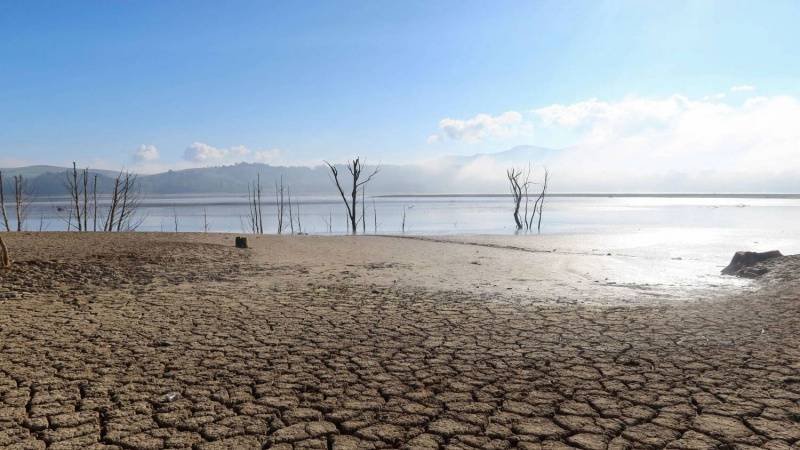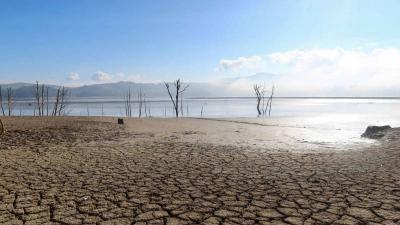Climate change poses questions about how to confront it in Tunisia and the government's ability to provide the necessary mechanisms and plans, amid the worsening drought crisis, significant rise in temperatures, and alterations in seasonal patterns. The repercussions of climate change have begun to directly affect agriculture and the availability of food and water, threatening food security in the North African country. The decline in rain and its irregularity during the previous period has negatively impacted agricultural crops, with estimates indicating a 60% decrease in grain crop levels compared to usual levels, according to data from the Tunisian Ministry of Agriculture. The ministry's data showed that only 2.7 million quintals of grain were collected in the 2022 season, compared to 7.5 million quintals in the previous season and 15 million in 2020. Observers expect the negative effects of this phenomenon to manifest more extensively and rapidly in the coming years, leading to a crisis in food and agriculture.
**Crop Decline**
Beyrem Hamada, a member of the Tunisian Farmers' Union, told Reuters that the drought crisis, soaring temperatures, fires, and water scarcity have caused a reduction in cultivated areas and a decline in yields, resulting in significant financial losses for farmers. Hamada explained that there has been a significant drop of over 50% in several crops due to water scarcity and climate change. He added that citrus production (including various types of oranges) has decreased to 300,000 tons this season, down from over 500,000 tons in previous seasons. Olive production, which represents Tunisia's most important export, is also facing the threat of a significant decline, thus increasing the food trade deficit in a country experiencing a critical economic situation. Farmers and the agriculture union anticipate a meager grain harvest this year due to the significant lack of rain. Nearly 2.7 million families in Tunisia are facing a shortage of bread, which primarily relies on hard and soft wheat. With local production deficits, the government has no choice but to increase grain imports from abroad. Due to the drought, scarcity of fodder, and rising feed prices, many farmers have been forced to abandon thousands of cattle, resulting in a substantial reduction in milk production, which has largely disappeared from stores. This has fueled concerns among residents who struggle to obtain other goods like sugar, oil, butter, and rice.
With diminishing water resources, fears are growing in Tunisia about thirst this year, leading the government last month to raise drinking water prices for homes and hotels in an effort to conserve. Hamada noted that "the rise in fruit and vegetable prices in markets has led to a significant supply shortage and increased production costs amid this crisis, compounded by the problem of brokers who buy farmers' outputs at low prices and resell them in markets at exorbitant prices while inflation eats into the pockets of Tunisians."
**State of Emergency**
Climate forecasts in Tunisia show a decrease in rainfall to 22 millimeters by 2050, representing a 9% decrease compared to current levels, and it will reach 45 millimeters by 2100, indicating an 18% decrease. Climate experts state that despite Tunisia's international commitments on climate change in line with the Paris Agreement and the Kyoto Protocol, there has not been adequate attention to climate change issues, nor have they been integrated into government policies or a clear strategy established to mitigate the impacts of the phenomenon. While experts have called for declaring a water emergency in the country due to the ongoing drought and alarming decline in dam levels, the government encouraged citizens in the 2023 budget law to dig water retention structures to collect rainwater.
Hakim Al-Qabthani, director of the Water Research and Technology Center in Borj Cedria, explained that September and October saw a 95% drop in rainfall compared to normal averages, according to local studies. Al-Qabthani pointed out that this drought has also impacted the environmental side, as Lake Ichkeul, the largest reserve in Tunisia, is facing an ecological disaster causing migratory birds to leave. He called for the necessity of supporting farmers and stopping violations against water resources "in random and illegal ways, as official figures indicate that 60% of wells are illegal." He confirmed the essential need to change the agricultural map in Tunisia "and intensify water treatment stations across the country, in addition to seawater desalination, which is considered the best and only solution at present."
Abdul Raouf Al-Ajimi, head of the Tunisian Minister of Agriculture's office, told Reuters that Tunisia is preparing studies to build dams and seawater desalination plants in several governorates as part of the development plan extending from 2023 to 2025. He stated that the ministry is following a special strategy to protect water resources and launching awareness campaigns to address water scarcity with a focus on unconventional sources such as seawater desalination and increasing investments in this sector.




